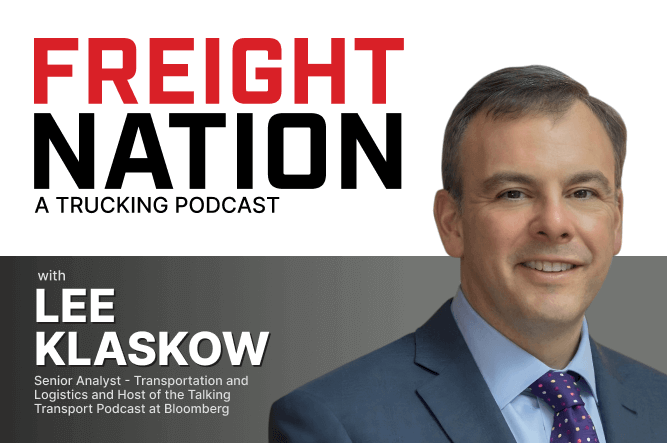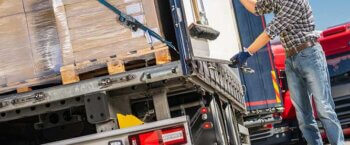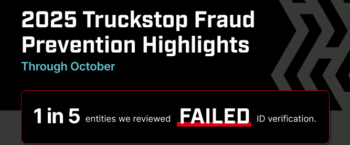Podcast: Lee Klaskow on Global Transportation

Listen up!
Check out our trucking podcast, Freight Nation.
Transportation and logistics are what make the world turn. And all modes of transportation, sea, air, rail, and road, are interlinked. Understanding how they impact one another globally and domestically is an important part of doing business.
In this episode of Freight Nation: A Trucking Podcast, host Brent Hutto is joined by Lee Klaskow, Senior Analyst of Freight Transportation and Logistics at Bloomberg Intelligence and Host of Talking Transports, to explore the current global state of transportation and how it’s evolving.
From Wall Street to Logistics
Lee’s career began in finance, specifically on Wall Street, so how did he become a transportation expert?
Like most, he found his way to transportation through a series of roles that organically led him to the industry, despite his intentions of pursuing a career as a casino analyst. But he knew the customer base already, and his boss was confident he could hit the ground running.
Klaskow has been an analyst covering freight, transportation, and logistics for almost 19 years and has become a trusted source in the industry. He speaks to the American Trucking Association (ATA), the CSCMP, and other industry-leading associations as a reliable source of data that helps inform businesses across the country.
The Impacts of Global Transportation
Lee covers trucking in his role but also examines other transportation methods, such as railroads and marine shipping.
He’s paid particular attention recently to the Red Sea crisis, which continues to have wide-ranging implications. Ships have to spend twelve extra days on each journey, avoiding the Red Sea and Suez Canal and instead going around Europe and Africa to the east coast of the USA.
When you combine this with the issues in the Panama Canal and the Russia-Ukraine conflict, it’s no wonder things are getting complicated in the transportation world. Lee predicts increased congestion at ports, which may actually benefit the trucking and railroad industries as shippers might choose to head to the West Coast instead, meaning more land transportation is required.
“It’s not gonna be like during the pandemic where there were 102 ships outside of Southern California waiting to dock. But you could see some slight increased congestion. You could see some shippers saying, hey, instead of going to the East Coast or the Gulf Coast, maybe they’re just going to the West Coast. That’s good for trucking. That’s good for rails. You know, longer lengths of haul for freight that’s going across.”
Ultimately, the global markets are in flux and will remain so until the Red Sea conflict ends.
Using Technology to Access Data
With two decades in the industry, Lee has seen a great deal of change, but the biggest is the way technology is used, which allows people to make better decisions. Take smartphones as an example. Owner-operators can now make very informed decisions while on the road about whether or not to take a load, which will influence their ROI.
“Now, an owner-operator can make a very really informed decision about whether or not they can take a load. And I think people that leverage the tools that are just on their phone, they probably can truly improve their ROI, and that technology benefits not only the owner-operator but the C.H. Robinsons, and the J.B. Hunts, and the CSXs, and the FedEx’s of the world.”
AI is also influential. It’s next to impossible that it will take over drivers’ roles, but we already see additive benefits that are transformative for our productivity. It’s automating predictive, manual tasks, thus allowing us to focus our efforts where they’re truly needed.
To learn more about the global state of transportation, tune into this episode of Freight Nation: A Trucking Podcast on Apple, Spotify, or your favorite podcast platform.
Get helpful content delivered to your inbox.
Sign up today.
Find high-quality loads fast, get higher rates on every haul, and access tools that make your job easier at every turn.






